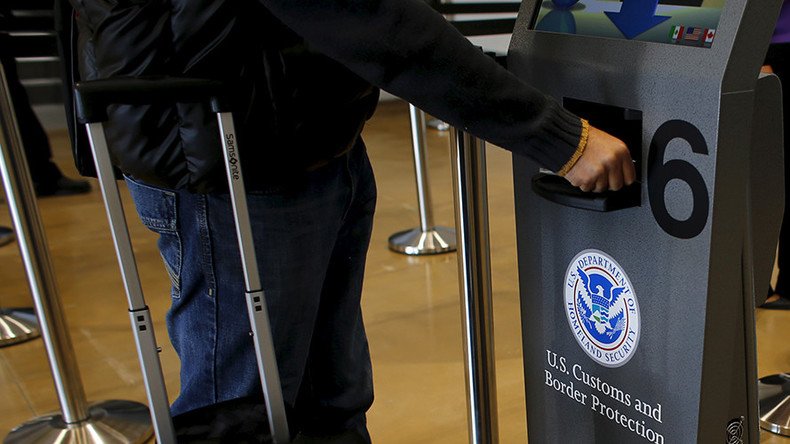Click to share with Homeland Security: DHS to monitor visa-waiver applicants’ social media

The process for visa-waiver applicants has been under fire from US citizens and politicians alike. But one program in particular, monitoring the social media presence of foreign visitors, is being targeted by a wide coalition of civil liberties groups.
Twenty-eight organizations are banding together to keep the Department of Homeland Security (DHS) out of visa-waiver applicants’ Twitter feeds and other social networking accounts.
Citing a combination of invasion of privacy, potential for racial profiling and general pointlessness, organizations such as the American Civil Liberties Union and the Center for Democracy and Technology are hoping to get the DHS to nix the proposal.
The visa-waiver program allows for residents of other countries, primarily Western European nations, to come into the US without a visa for up to 90 days as a tourist. In exchange, US residents may also travel to the 38 eligible countries without applying for a specific visa.
But a proposal from the DHS would require US Customs and Border Patrol to implement “that certain categories of visitors to the United States be asked to disclose information about their 'online presence' in their visa-waiver arrival/departure records (Form I-94W),” according to the Center for Democracy and Technology (CDT).
‘Security gap’: Visa Waiver Program missing data on terrorists https://t.co/F7ULHrY9hApic.twitter.com/aMXeERoBwR
— RT America (@RT_America) June 7, 2016
The customary form, I-94W, is fairly straightforward and merely asks for a person’s name, address, criminal record, health status and duration of stay. However, the DHS proposal to add social media disclosure could put more information in the hands of the government.
Not to mention that cultural and language barriers could leave a wide range of tweets open to interpretation. For example, here is the classic, “Thanks Obama,” meme with four different meanings.
THANKS OBAMA!! https://t.co/S30Xra6dMMpic.twitter.com/gNUOKESUUe
— King Robbo (@realkingrobbo) August 14, 2016
Waking up to thugs burning down a gas station, #BlackLivesMatter terrorist org at it again, Thanks Obama you Asshole! #Milwaukee
— YoWillieM™ (@YoWillieM) August 14, 2016
When did the Olympics change from being Country vs Country to black, white, Muslum, & clothing catagories? #ThanksObama , #DividerInChief
— Sassy (@sassylassee) August 14, 2016
Gas prices? Down. Employment? Up. Inflation? Down. Stock market? Up.
— Stephen King (@StephenKing) August 17, 2016
THANKS, OBAMA!
It is plausible to believe that if someone from another country with a different cultural background read all four of these, they could believe that two Twitter users were being sarcastic in their disparagement of Obama or that one Twitter user holds Obama responsible for the death of Harambe.
Therefore, the CDT’s reservations about the usefulness of the plan may have some merit.
They are also concerned with the possible invasion of privacy this would entail. The CDT wrote, “Individuals’ ‘online presence’ could include their reading lists, political affinities, professional activities, and private diversions.”
The Center believes that with these risks, some individuals would feel pressured to delete their accounts, which in this social media-centric world could pose risks to their livelihood or social relationships.
It won’t only be the DHS potentially looking at visa-applicants’ swimsuit pictures, either.
“All of the information collected through ESTA [Electronic System for Travel Authorization] is shared, in bulk, with U.S. intelligence agencies and can be used to seed more intelligence surveillance unrelated to the applicant’s eligibility for a visa waiver,” the CDT wrote.
The ACLU, a member of the CDT, has reason to be concerned about information from ESTA being funneled to other surveillance agencies. The ACLU has “noted troubling indications that the government watch lists people in an arbitrary or discriminatory way, particularly members of American Muslim, Arab, and South Asian communities.”
The CDT says that social media “is likely to be used to augment existing lists and databases for tracking persons of interest to law enforcement and intelligence agencies, with consequences for innocent individuals swept up in those programs.”
So for someone on already on a watch list, a sarcastic “Thanks Obama” tweet could potentially put them in hot water.
Loopholes in US visa system play into human traffickers’ hands – report https://t.co/0B1wtlvZG4pic.twitter.com/jDlWJpnSjo
— RT America (@RT_America) January 12, 2016
Another example is the nuanced mastery of culture and language the person monitoring a social media feed requires to monitor a social media feed. For example, if a person of Egyptian descent tweets out “Howa enta ma’ndaksh rehet el dam?” it would literally translate to “Do you not even have the smell of blood?” That sounds threatening. But the meaning of that phrase is to suggest that someone is being heartless.
The CDT also believes that this proposal would accomplish extremely little, because there would be nothing to stop someone who wanted to do harm from just making a fake profile with nothing except for cat pictures.
Lastly, this plan is really expensive and that does not seem to be something the DHS has taken into consideration. Looking into social media would require an automated process to review social media, but “Automated processing of this data would require sophisticated capabilities in machine learning and complex network analytics that will dwarf the Department’s cost projection.”
The CDT has submitted its concerns to the DHS in the hopes of convincing it to withdraw its proposal. Until that happens, here’s to hoping that DHS follows back.












